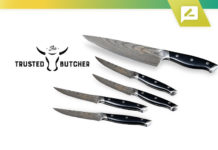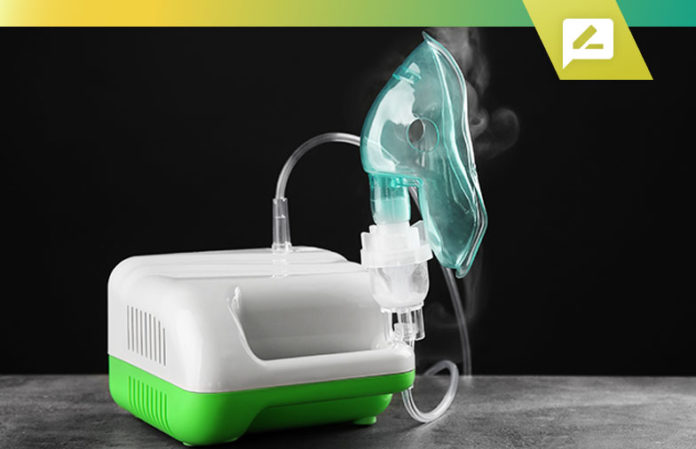Nebulizers turn liquid medicine or essential oil into a mist. They’re commonly used by people with breathing disorders. Someone with asthma, emphysema, cystic fibrosis, COPD, or another breathing disorder might take medicine via a nebulizer, for example.
Alternatively, many people use nebulizers to diffuse essential oil. You might add essential oil to a nebulizer, using it to relieve a sore throat. Others use nebulizers to treat symptoms of colds and flus. Some use nebulizers for general health and wellness.
Today, you can buy nebulizers online through Amazon and other retailers. Trusted brands like Philips sell Nebulizers, for example. The best nebulizers promise to provide high-quality aerosol therapy for the management of respiratory conditions.
Nebulizers are also labeled as compressors on some online stores. The terms are used interchangeably, although they’re not technically the same thing. There are also multiple types of nebulizers, including jet nebulizers, ultrasonic nebulizers, and vibrating mesh nebulizers.
Which nebulizer is right for you? Which nebulizer should you buy? Keep reading to discover the best nebulizers available today, as well as a wealth of research into the core aspects of nebulizers that you need to know, complete with a section of frequently asked questions about nebulizers and nebulizer manufacturers.
Get the Best In-Stock Nebulizer Today
Contents
Ranking the Best Nebulizers of 2023
As a general note, remember that the rankings below are based on the developed opinions of our Advanced Living staff. However, our top picks are in no particular order, and users might have different preferences, opinions, and priorities than the writers who hand-picked these top nebulizers.
Philips Home Nebulizer
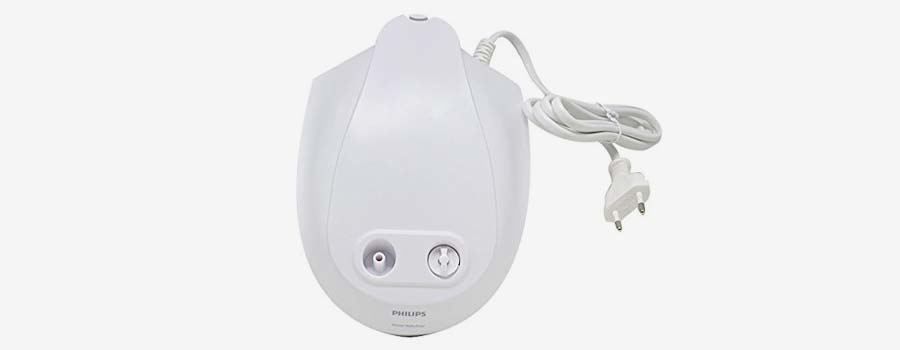
The Philips Home Nebulizer is one of the most-trusted options on this list. Made by electronics giant Philips, this nebulizer uses SideStream technology to draw in air through an active vent system. That means faster medication delivery and shorter treatment time. The Philips Home Nebulizer also has a jet design that produces high-quality aerosol consistently for effective treatment.
Philips claims its unit will work in six minutes. It’s also quiet and easy for anyone to use, making it suitable for kids and adults. You need 4 x AAA batteries to use the Philips Home Nebulizer.
Click Here to Find the Lowest Price Now
Flyp Portable Handheld Nebulizer

Flyp’s Portable Handheld Nebulizer, like many others on this list, is designed for maximum portability. The unit weighs just 3.6 ounces. It’s not just small enough to fit inside your purse: it’s small enough to fit in your pocket.
Flyp doesn’t compromise portability for effectiveness. The unit is very efficient, delivering most medication in under seven minutes. It’s also surprisingly quiet thanks to Flyp’s unique ultrasonic technology and near-silent design. Oh, and unlike many other nebulizers on this list, there are no tubes or mask to worry about: Flyp delivers medication to the user using a simple, collapsible plastic mouthpiece. That mouthpiece folds flat after treatment.
Making Flyp even more useful is that the nebulizer does not require batteries or an electrical socket; instead, the unit is powered by a rechargeable lithium ion battery that can provide up to eight rounds of medication on a single charge.
Click Here to Find the Lowest Price Now
Omron MicroAir U100

Omron is another trusted brand that makes a popular, best-selling nebulizer. This high-volume nebulizer delivers medication to your lower airways at a rate of 0.2 mL per minute. The device passes compressed air at a high speed through liquid medicine in the cup, converting it into an aerosol mist. Simply inhale to deliver the medication into your body.
Omron’s MicroAir U100 is a small, portable nebulizer operated by batteries. It uses a unique mesh technology that makes it efficient, silent, and comfortable. Like other Omron nebulizers, the MicroAir U100 comes with a carrying case for maximum portability.
Click Here to Find the Lowest Price Now
Sunset Healthcare Mini Portable Mesh Nebulizer
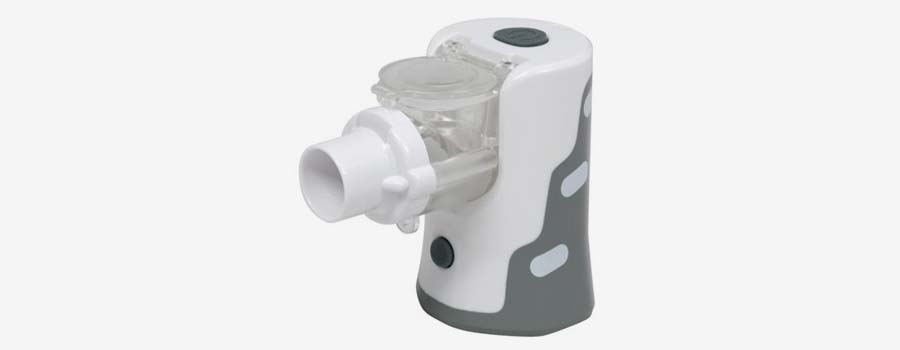
Sunset Healthcare’s Mini Mesh Nebulizer is one of the most popular portable nebulizers available today. The nebulizer is small enough to fit inside a purse or handbag. It also uses an ultrasonic vibrating mesh nebulizer system to aerosolize physician-prescribed liquid medications – similar to any other nebulizer on this list.
What makes Sunset Healthcare’s nebulizer unique is its ultrasonic vibrating mesh nebulizer system and its portability. If you want efficient medication delivery at a reasonable price, then the Sunset Healthcare Mini Portable Mesh Nebulizer may be the right choice.
Click Here to Find the Lowest Price Now
Intelligent Mesh Handheld Portable Nebulizer by Briutcare
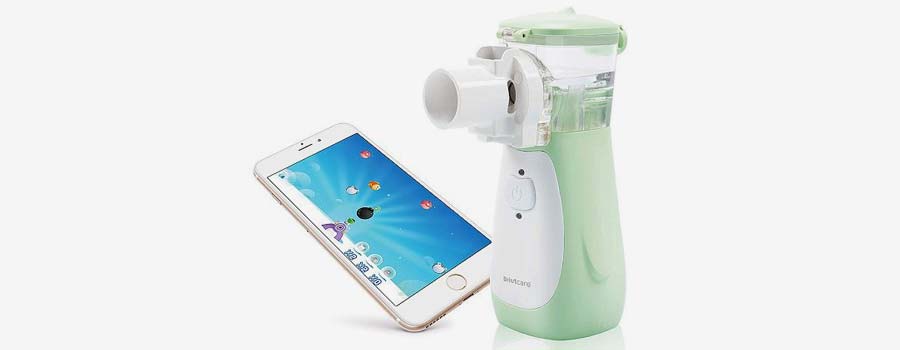
The Intelligent Mesh Handheld Portable Nebulizer by Briutcare is the only nebulizer on this list that comes with its own smartphone app. The pocket-sized, adjustable nebulizer is designed for both adults and children, available in pink or green. When connected to the smartphone app, users can adjust the nebulization rate to suit their needs. The app also has interactive games for children (or adults) designed to keep them distracted throughout the administration process.
The nebulizer uses patented vibration mesh technology to create particles smaller than 5 micrometers, reducing medicine wastage. Like the Fylp nebulizer above, this unit uses a rechargeable lithium ion battery with a USB cable, with each charge lasting for up to 4 hours of constant nebulization. It also operates at just 35 dB, making it literally whisper quiet.
Click Here to Find the Lowest Price Now
MABIS Personal Steam Inhaler Vaporizer
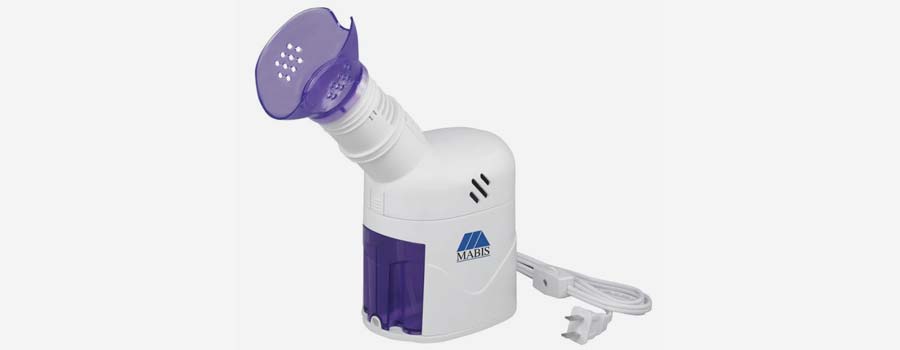
MABIS’s nebulizer is popular on Amazon, where the unit has over 1,600 reviews from customers. The nebulizer claims to “naturally and effectively” relieve respiratory symptoms linked to the common cold, sore throat, coughing, flu, bronchitis, asthma, allergies, and more.
The unit also has an adjustable filter-free steam control with an aromatherapy tank, making it easy for you to control the amount of steam your steam vaporizer produces. All steam is delivered through a soft, flexible mask.
Click Here to Find the Lowest Price Now
Omron NE-C25S Nebulizer
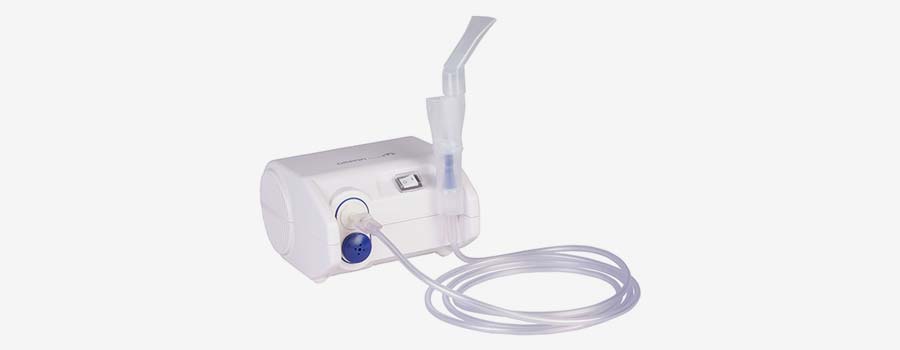
Omron’s NE-C25S nebulizer is a less popular version of the Omron MicroAir U100. However, it’s a well-rated and portable nebulizer that uses a quiet design to effectively deliver medication into the body.
Omron’s NE-C25S Nebulizer comes with a carrying case, making this more portable. It’s not as small or portable as other options on our list due to its bulky design. However, the Omron NE-C25S Nebulizer is still one of the best nebulizers on the market.
Click Here to Find the Lowest Price Now
Wave Medical Products Brian the Bear Nebulizer
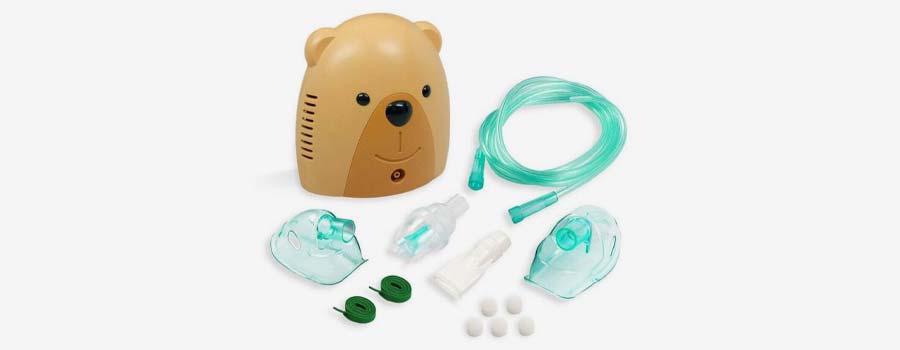
Nebulizers are commonly used to give medication to children. If you’re shopping for nebulizers for children, then the Wave Medical Products Brian the Bear nebulizer is one of the more popular options on the market.
Priced at $80, the nebulizer has a child-friendly design – including a distinctive, bear-style nebulizer machine. The kit comes with all of the accessories you need, including a full mask kit, air tubing, mouthpiece, and reservoir cup.
Click Here to Find the Lowest Price Now
Equinox EQ-NL 72 Nebulizer
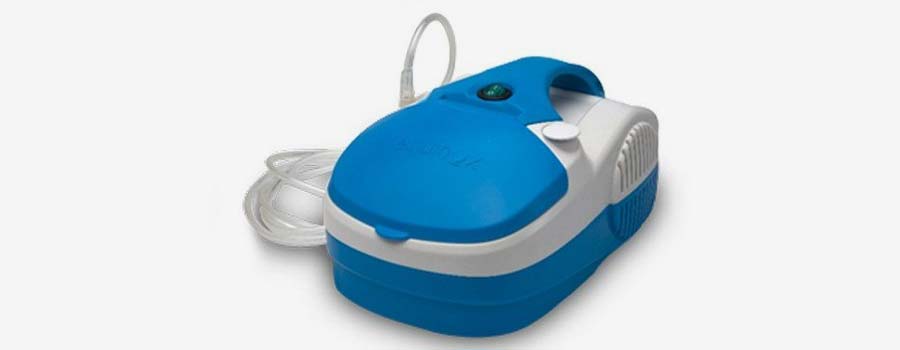
The Equinox EQ-NL 72 Nebulizer is a non-heating compressor (nebulizer) that is portable, easy-to-use, and efficient. The nebulizer isn’t as stylish as some of the options listed above, but it vaporizes medication and delivers it at a reasonable price.
The nebulizer uses something called Virtual Valve Technology (VVT) to boost its efficiency. Your Equinox nebulizer kit comes with an air tube, replacement filters, and a medication cup with a capacity of 6 milliliters.
Click Here to Find the Lowest Price Now
PulmoNeb Nebulizer Compressor
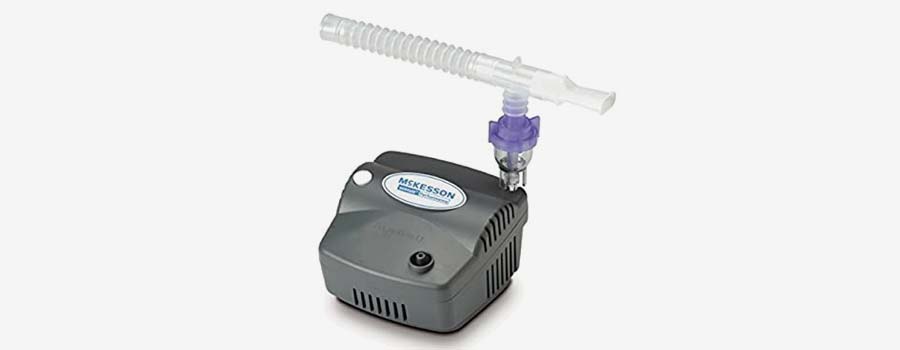
The PulmoNeb Nebulizer Compressor is one of the most affordable options on this list. It’s a small, budget-friendly nebulizer that takes up less space on the table during treatment. It’s also lightweight, making it more portable for parents and practitioners alike.
The main drawback of the PulmoNeb Nebulizer Compressor is that it needs to be hooked up to a power source, which can reduce its portability. You may not be able to use it easily while traveling, for example. However, if you’re looking for a budget-friendly nebulizer, then the PulmoNeb Nebulizer Compressor may be the right choice for you.
Click Here to Find the Lowest Price Now
Innospire Elegance Nebulizer
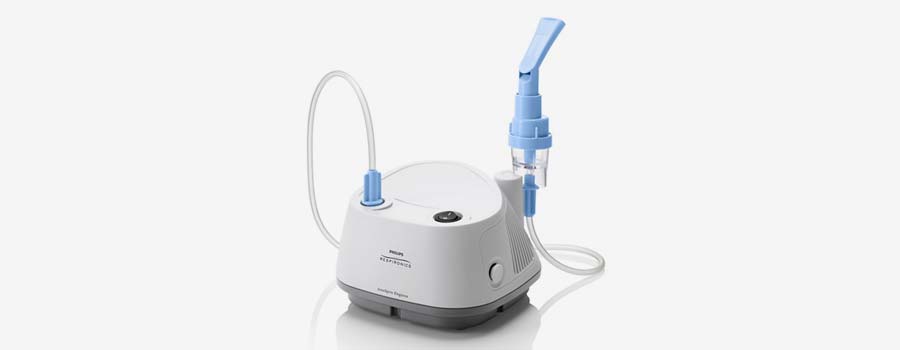
The Innospire Elegance Nebulizer increases medication delivery, making treatment more effective with less medication waste. The increased efficiency means that each treatment is more effective, leading to decreased symptoms and relief.
Innospire’s Elegance Nebulizer isn’t the quietest or more affordable option. However, it’s one of the highest-quality and best-rated nebulizers among medical professionals, especially for those interested in reducing medicine wastage.
Click Here to Find the Lowest Price Now
Pari Trek S Portable Compressor Nebulizer Aerosol System
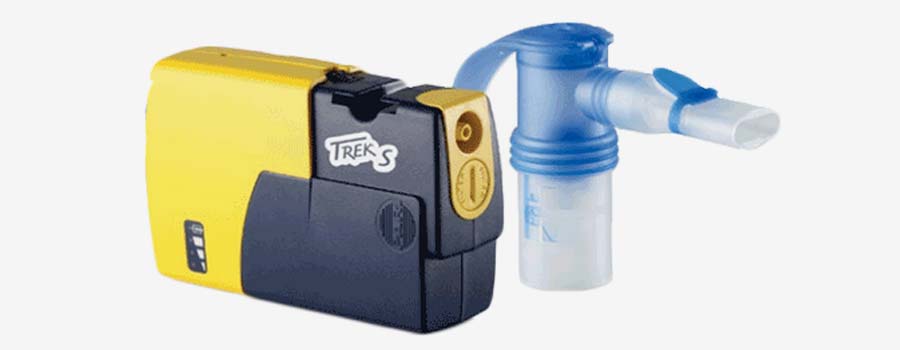
The Pari Trek S is a portable nebulizer that may be the lightest weight option on this list. At just one pound, the Trek S is extremely portable, making it ideal for carrying out treatment anytime, anywhere.
The Trek S delivers medication in about 5 to 6 minutes. It’s also one of the smallest options here, making it ideal for those who want to carry a nebulizer in their purse or backpack on-the-go.
Click Here to Find the Lowest Price Now
Pulmo Aide Compressor Nebulizer
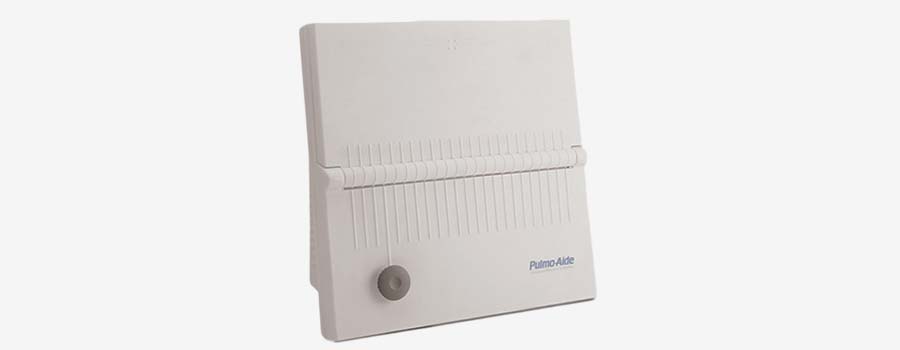
The Pulmo Aide Compressor Nebulizer is one of the largest nebulizers on this list. However, it’s also one of the most powerful, capable of delivering up to 12 lpm of medication. It’s also designed to be durable and long lasting: each unit comes with a five year warranty, and the manufacturer claims you can expect it to last for ten years.
The Pulmo Aide Compressor Nebulizer is much louder than other compressors, although it won’t be disruptive in a normal environment – like a restaurant or office.
Click Here to Find the Lowest Price Now
DevilBiss Traveler Portable Compressor
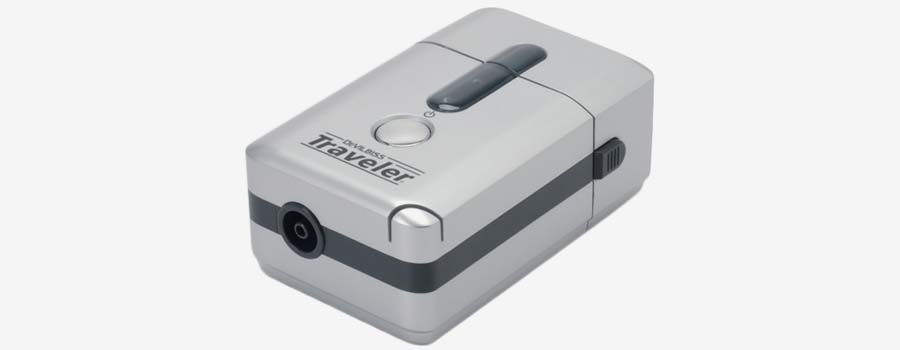
DevilBiss’s Traveler is a portable compressor nebulization system that is even smaller than the Trek S listed above, making it the best option for those seeking effective nebulization on the go. The unit is louder than the Pari Trek S. However, the noise is comparable to other options on this list.
The DevilBiss Traveler is an easy nebulizer to use, featuring a simple one-touch option. It continues to be a top-seller in the medical community. We have also seen this unit labeled as a “Drive Medical Traveler” on certain online retailers.
Click Here to Find the Lowest Price Now
How We Ranked the Top Nebulizers
Nebulizers all make similar promises about their effectiveness. Consumers should be aware that some companies over-extend the potential benefits of their products, especially when they think they can get away with it to make some extra money. Our writers evaluated the following qualities when adding products to our rank of the top nebulizers of 2023:
- FDA Approval: Medical-grade nebulizers require a prescription because they need FDA approval.
- Power Source: Nebulizers are powered by AAA batteries, electrical outlets, or rechargeable lithium ion batteries.
- Container Size: Nebulizer container sizes vary from 5mL to 1mL or more.
- Ease of Use: Is the nebulizer easy to use? Or is the nebulizer challenging to setup and operate correctly?
- Cleanability: Is the nebulizer easy to clean? Do the parts easily detach for seamless cleaning?
- Nebulization System: Nebulizers use jet, ultrasonic, or vibrating mesh nebulization systems. Each system has its own unique advantages and disadvantages.
- Particle Size: Different nebulization systems have different particle sizes, ranging from 1 to 8 micrometers.
- Nebulization Rate: Nebulization rate affects the speed at which medication can be delivered. Nebulizers vary from 0.25 mL to 3 mL per minute.
- Portability: Some nebulizers are designed to be carried in a purse or pocket, while others are designed for at-home or clinical use. We analyzed weight, size, and portability.
- Manufacturer Reputation: Some manufacturers have a long and proven track record of creating high-quality nebulizers, while others have a limited history.
- Scientific Evidence: Some nebulizer manufacturers have invested in formal scientific or clinical testing, while others have not.
Who Should Use a Nebulizer?

People who suffer from chronic illnesses like asthma, cystic fibrosis, chronic obstructive pulmonary disease (COPD), emphysema, and other respiratory conditions often use nebulizers as the primary delivery source of their medication.
Nebulizers are also commonly used to deliver medication to infants or children. If a child or baby gets a cold, for example, then a doctor may prescribe a nebulizer to reduce the child’s breathing problems.
Doctors may also prescribe nebulizers as part of a respiratory treatment plan for acute illnesses like bronchitis or pneumonia. Nebulizers can also be used for emergency asthma treatment.
Inhalers and nebulizers are similar. Both deliver medication in a unique way. However, nebulizers are particularly helpful for adults and children too weak to use inhalers. Nebulizers may also be used by people with limited dexterity in their hands.
What types of medicine can be delivered via an inhaler? Nebulizers can deliver short-acting rescue medicines or long-acting medication. Medicines that work well with nebulizers include corticosteroids, albuterol, levalbuterol, xopenox, ipratropium bromide, cromolyn sodium, and budenoside formoterol. Nebulizers can also be used to deliver other bronchodilators, sterile saline solutions, and antibiotics.
Some people don’t use nebulizers for medication at all: some people use nebulizers to deliver essential oils. Nebulizers can diffuse essential oils, delivering the active ingredients in the essential oils directly into your body.
Benefits of Nebulizers
Nebulizers turn liquid medication into a gas, making it easier to inhale. Doctors regularly recommend nebulizers as an effective way to deliver medicine into the body. A nebulizer, simply put, is a breathing machine.
As explained in this study from 2002, nebulizers are one of several devices used to deliver inhaled asthma medication. Doctors may also recommend metered dose inhalers (MDIs) or dry powdered inhalers (DPIs).
Some research has shown nebulizers are an effective way to deliver active ingredients into the body, while other research has been mixed.
This study, for example, showed that less than half of the dose of common inhaled steroids makes it into your lung when using a nebulizer, for example, which could make nebulizers half as effective as other asthma control solutions.
Others criticize nebulizers because of the length of time it takes to administer treatment. Treatment can take anywhere from 5 to 15 minutes. Other treatments, including an MDI with a spacer, delivers the same amount of medicine to the lungs in under one minute.
Nevertheless, nebulizers remain popular among all types of people. The main benefit of a nebulizer over other medication delivery methods is that the nebulizer is easy to use. The patient just sits there and breathes normally to get the correct dosage of medication exactly where it needs to go: deep into your lungs.
Nebulizers may also be more effective than metered dose inhalers (MDIs). MDIs require a level of skill and dexterity to correctly deliver medicine to your lungs. When used incorrectly, MDIs can deposit most of the medicine to the back of your mouth instead of into your lungs. This can lead to side effects like hoarseness and thrush.
Another advantage of a nebulizer is that you can mix multiple medications at once and deliver them simultaneously. You mix liquid medications into the cup, then run the nebulizer.
Many people use nebulizers to deliver essential oils into the body. Does this actually work? There is some research showing that nebulizer essential oils can deliver certain benefits.
This study published in the Iranian Journal of Nursing and Midwifery Research in 2016 discussed the effect of nebulized eucalyptus on the contamination of microbial plaque in the endotracheal tube in ventilated patients. Researchers found that nebulized eucalyptus oil could reduce microbial contamination within the tube, reducing the risk of infection among ventilated patients.
The study above showed nebulized essential oils reduced microbial plaque in the endotracheal tube – not the actual patient. There was also no difference in other bacteria between patient groups – so essential eucalyptus oil only reduced microbial plaque buildup and not the buildup of other contaminants.
A similar study published in the same journal in 2016 analyzed the effects of lavender essential oil on 140 women admitted to the obstetric and gynecological unit. Women inhaled three drops of lavender essential oil every eight hours for four weeks. At the end of the study, women in the lavender group had lower rates of postpartum depression and, stress, and anxiety compared to a control group.
Researchers concluded that “inhaling the scent of lavender for 4 weeks can prevent stress, anxiety, and depression after childbirth”.
There have been few studies examining the effect of nebulized essential oils on the human body. The two studies linked above were both performed at the same hospital in Iran and published in the same journal. Overall, most human studies on essential oils have been inconclusive, although essential oils remain popular today.
How to Use a Nebulizer
Using a nebulizer is straightforward. Talk to your doctor to determine the best way to use your nebulizer. Or, follow the instructions on your essential oil nebulizer. Here’s the basic step by step guide for a traditional nebulizer:
Step 1) Put the nebulizer on a flat surface
Step 2) Connect the nebulizer to a power source (if necessary)
Step 3) Wash your hands before preparing the medication, essential oil, or whatever other liquid you’re placing inside the container
Step 4) Place the liquid inside the container
Step 5) Connect the tube to the nebulizer and the liquid container
Step 6) Attach the mouthpiece or mask
Step 7) Turn on the switch and verify the nebulizer is misting
Step 8) Place the mouthpiece in your mouth and close your mouth around it; or, if using a mask system, place the mask securely over your nose and mouth with no gaps
Step 9) Breathe in and out until the medicine is gone, which takes 5 to 15 minutes depending on your nebulizer
Make sure to keep the liquid container upright throughout the treatment.
Most nebulizers need to be cleaned after each use and disinfected after every other treatment. Remember: you’re breathing vapor from a machine, and it’s crucial that the vapor is clean. If you do not clean the machine correctly, then you could start inhaling bacteria and other germs, which could lead to serious illness.
Types of Nebulizers
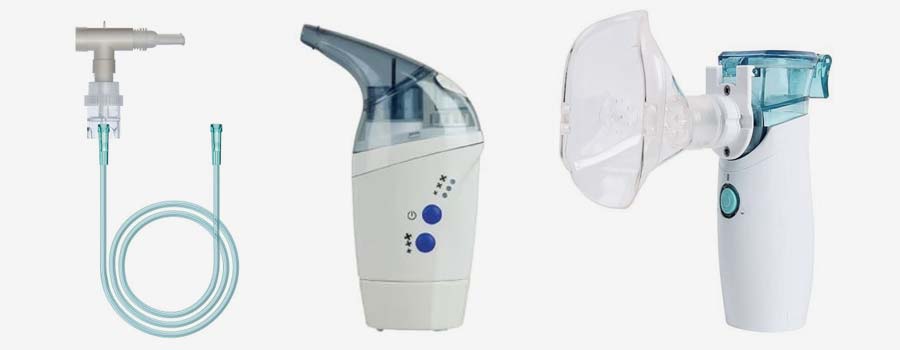
There are three main types of nebulizers, including jet nebulizers, ultrasonic nebulizers, and mesh nebulizers.
Jet Nebulizers
Jet nebulizers deliver a fine liquid mist of medicine by passing compressed air through a mouthpiece. Jet nebulizers come with a small plastic cup attached to the mouthpiece. You add liquid medicine to this cup. The mouthpiece is connected to the compressed air source through plastic tubing. When you start the motor, the nebulizer shoots air through the cup (like a jet), converting medication into a fine mist and delivering it into the lungs.
- Pros: Cheap and easy to use
- Cons: Loud and not very portable
Ultrasonic Nebulizers
Ultrasonic nebulizers use a transducer to release ultrasonic waves. These nebulizers are particularly popular for alleviating asthma symptoms and chronic illness. Minimal patient coordination is required, and ultrasonic nebulizers deliver medication much more quickly than jet nebulizers. You also do not need to mix saline for asthma medication.
- Pros: No compressor required,
- Cons: Battery operated
Mesh Nebulizers
Mesh nebulizers have a built-in small mesh membrane. The nebulizer releases liquid medication through tiny holes in the mesh. These types of mesh nebulizers deliver medication more quickly than any other nebulizer on this list, although they’re also more expensive. Mesh nebulizers use AAA batteries, electrical outlets, or a lithium ion battery for power.
- Pros: Fastest, most efficient nebulizer technology available
- Cons: You need to clean the mesh frequently to avoid clogging; expensive
Side Effects of Nebulizers
Nebulizers are generally safe to use when used correctly and under the direction of a medical professional. However, if you fail to clean your nebulizer regularly, or if you fail to follow instructions, you could experience various side effects.
Nebulizers could also increase the spread of the COVID-19 coronavirus. In this study published on March 3, 2023, researchers in Alberta concluded that healthcare organizations should “reconsider any plan or order for a nebulizer therapy.”
“To reduce the risk of transmission of all infectious respiratory illnesses in healthcare facilities we would encourage all caregivers in all other provinces to align with the above restrictions and seriously consider avoiding the use of nebulizers.”
This risk is relevant to healthcare organizations dealing with at-risk populations or patients with coronavirus. The risk of coronavirus transmission is minimal for one person using one nebulizer.
Frequently Asked Questions About Nebulizers
Especially when nebulizers are so important to the health of millions, it is only natural to have a number of questions about this type of product. This section will answer some of the most commonly asked questions about nebulizers, as well as the companies producing them.
Q: What is a nebulizer?
A: A nebulizer is a machine that turns liquid medication into a vapor. You place a mask over your mouth or nose, then breathe in normally. The nebulizer delivers the medication into your body. These devices can deliver essential oils and other medications through the lungs, which helps to promote a number of potential health benefits, including increased respiratory health.
Q: Who should use a nebulizer?
A: Doctors may recommend nebulizers to patients with respiratory conditions, asthma, and other illnesses. Some people also use nebulizers to inhale essential oils. We advise that you seek the opinion of your doctor before beginning use of a nebulizer.
Q: Do you need a prescription to use a nebulizer?
A: Your doctor may prescribe a nebulizer to deliver medication. A prescription is required for certain medical-grade nebulizer machines, although there are consumer-grade nebulizers, steam machines, and vaporizers available without a prescription. Especially when products like these are available without a prescription, be sure to carefully vet the company and its reviews before using any commercial nebulizer.
Q: How does a nebulizer work?
A: A nebulizer vaporizes liquid into a mist, making it easy to inhale. The process is generally safe, and it makes taking medication easier for some consumers.
Q: What can you put in a nebulizer?
A: Most people put liquid medication into a nebulizer, including asthma medication. However, some people now put other liquids, including essential oils, in nebulizers.
Q: Do you need a battery for your nebulizer?
A: Some nebulizers use batteries, while others need to be plugged into an electrical source. Some modern nebulizers contain a rechargeable lithium ion battery. For full instructions, consult the manufacturer of your nebulizer device.
Q: How do you clean a nebulizer?
A: You clean a nebulizer with plain, warm, soapy water. Most experts advise against using strong or harsh detergents, especially those with a scent. Some people use a vinegar solution (like a 1/3 ratio of vinegar to water) for nebulizer cleaning. Disconnect the mask and tubing from the nebulizer before washing.
Q: How often should you clean a nebulizer?
A: Most experts recommend cleaning and disinfecting a nebulizer after each use. However, others claim you should be okay cleaning your own nebulizer once a week or after every other use.
Q: Why should you clean a nebulizer?
A: If you do not clean your nebulizer, then you could be inhaling bacteria, mold, and other contaminants, which could lead to severe illness or infection.
Q: Which type of nebulizer should you use?
A: Your doctor should recommend a specific nebulizer for you to use. If you do not have a prescription for a nebulizer, then you can use any of the top-rated nebulizers on Amazon (see the top of our list for recommendations).
Q: Can you mix medication inside a nebulizer?
A: Yes, you can mix multiple liquid medications together inside a nebulizer. However, talk to your doctor before mixing any medications, as there could be certain interactions.
Q: How long does a nebulizer take to deliver medicine?
A: An average nebulizer takes 5 to 15 minutes to deliver a full dose of your medicine, but this will depend heavily on the model of the nebulizer, as well as the type and quantity of medication being used.
Q: How do you dilute medicine for use in a nebulizer?
A: Most nebulized medication comes with a pre-mixed solution that can be added directly to your nebulizer. However, if your medication has not been nebulized, then you may want to mix it with normal saline.
Q: How do you know the medicine has been completely nebulized?
A: Continue nebulization treatment until the machine starts sputtering or delivering inconsistent nebulized medicine. For more complete instructions, consult the manufacturer of your nebulizer.
Q: What’s the difference between a compressor and a nebulizer?
A: Some nebulizers require compressors to work, while others do not. The terms compressor and nebulizer are often used interchangeably.
Q: Can insurance pay for your nebulizer?
A: If your insurance plan covers durable medical equipment, then you may be able to claim your nebulizer purchase under insurance. Most nebulizers are considered an HAS / FSA eligible purchase. This will depend on your insurance plan.
Q: How often do you need to replace masks, hoses, and filters on my nebulizer?
A: Each nebulizer system comes with its own instructions for care and cleaning. Your nebulizer will last longer when you follow the correct maintenance schedule. Masks, hoses, and filters may need to be replaced every few months or years. Or, they may work fine with ordinary cleaning.
Q: Why do you need a prescription for a nebulizer?
A: A nebulizer is a medical device. The FDA requires you to have a prescription to buy a medical-grade nebulizer. That’s because the FDA must assess the nebulizer before it can be sold and marketed in the United States (just like the FDA assesses any medical equipment).
Q: How do you get a prescription for a nebulizer?
A: Talk to your doctor or a respiratory specialist to get a prescription for a nebulizer. Commercial, non-prescription nebulizers are available, but they are often lower quality than medical-grade devices.
Q: How long does a nebulizer prescription last?
A: Many medical device prescriptions have no expiration dates, although some do. Consult the physician writing your prescription to verify for yourself.
Q: What is a jet nebulization system?
A: A jet nebulization system consists of two components, including a jet nebulizer that turns liquid medication into an inhalable aerosol mist; and a compressor that provides the air for the system.
Q: What is an ultrasonic nebulization system?
A: An ultrasonic nebulizer does not need a compressor to create mist. It uses electricity to turn liquid medication into a mist by directly vibrating the medication at a high frequency.
Q: What is a vibrating mesh nebulizing system?
A: A vibrating mesh nebulizer vibrates at a very fast rate, turning liquid medication into a mist. Unlike an ultrasonic nebulizer, a vibrating mesh nebulizer uses a stainless steel membrane with thousands of very small holes to turn liquid medication into a mist.
Q: Which nebulization system is best for me?
A: Talk to your doctor to determine the best nebulization system for you. The systems above vary widely based on efficiency, delivery method, and price.
A: Nebulizers are designed for one person only. You should not share nebulizers between multiple people. Multiple people using the same nebulizer can contribute to the spread of bacteria, mold, and even viruses through the device.
Q: Should you use a mask or mouthpiece with a nebulizer?
A: You should use a mouthpiece when appropriate. However, some nebulizers use masks, say, for delivering medicine to children, elderly people, or individuals with special needs. This depends on your specific situation and you should default to following the recommendations laid out by your doctor.
Q: What is the best way to clean nebulizer tubing?
A: You can clean nebulizer tubing by wiping the outside with a clean, damp cloth or paper towel. You should not submerge the tubing in water or use harsh chemicals.
Final Thoughts
Nebulizers vaporize liquid, letting you inhale the active ingredients of medication or essential oils.
Today, people with asthma and other respiratory conditions may use nebulizers to vaporize their medication. Some people also use nebulizers to inhale essential oils, delivering the active ingredients in a more bioavailable way.
Our guide to the best nebulizer products should provide consumers with everything they need to buy a nebulizer right for them.




